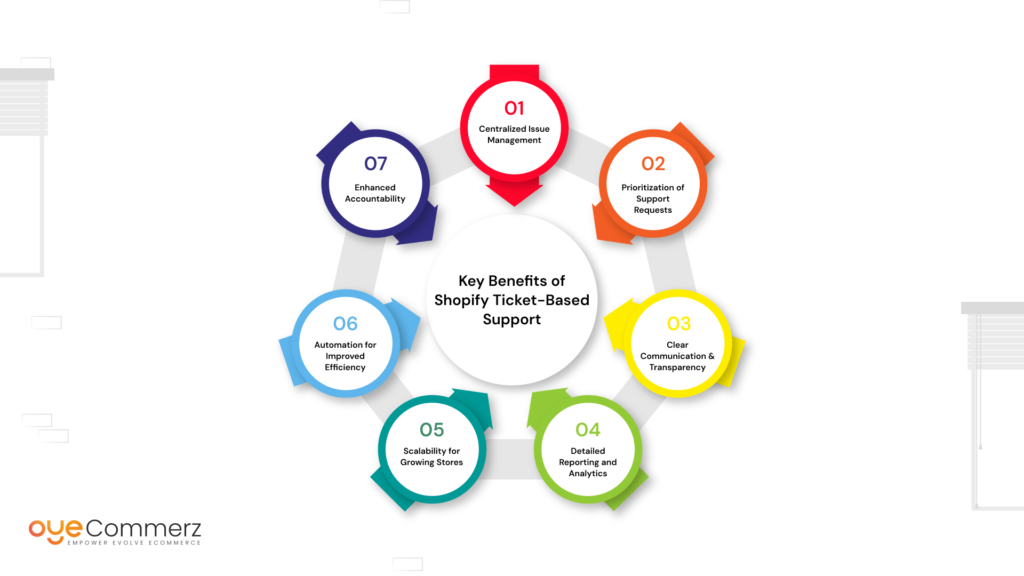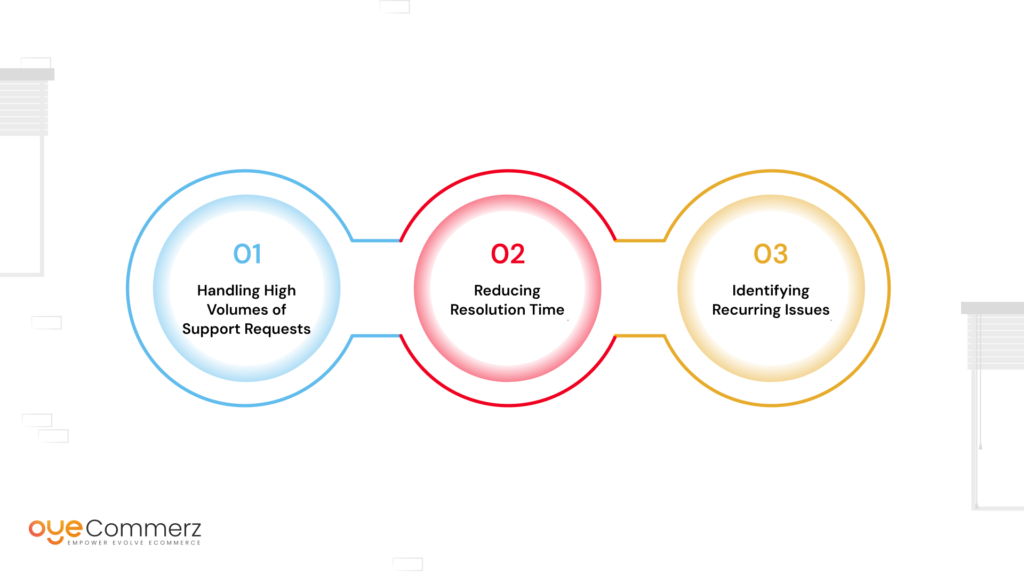In the fast-paced world of eCommerce, ensuring smooth store operations is critical for maintaining customer satisfaction and operational efficiency. However, managing a Shopify store comes with its set of challenges, such as technical bugs, plugin issues, and unexpected downtime. For Shopify merchants looking to streamline problem resolution and improve store performance, ticket-based support systems offer a robust solution. This method helps store owners track issues, prioritize tasks, and solve problems efficiently, ultimately enhancing the customer experience.
In this comprehensive guide, we will delve into Shopify ticket-based support systems, their benefits, how they work, and why they are indispensable for maintaining your online store.
Table of Contents
ToggleWhat is Shopify Ticket-Based Support?
Shopify ticket-based support refers to a structured method for handling support requests and issues within your Shopify store. It operates on a ticketing system that allows store owners or support teams to log, track, and manage issues that arise within the eCommerce platform. Each problem or request is assigned a unique ticket number, which streamlines the process of managing and resolving multiple issues concurrently.
How Does Shopify Ticket-Based Support Work?
A ticket-based system organizes store issues by categorizing them as “tickets” that need resolution. When a customer or team member reports a problem—whether it’s related to payments, product display, or system errors—a ticket is created and logged into the support system.
Each ticket will include:
- Issue Description: A clear explanation of the problem.
- Priority Level: Indicating the urgency of the issue.
- Assignment: The ticket is routed to the appropriate team or support agent for resolution.
- Tracking: The status of the ticket is updated as it moves through various stages of resolution.
- Resolution: Once resolved, the ticket is marked as complete.
Using this systematic approach ensures that no issue is overlooked, allowing businesses to provide faster and more organized support.
Key Benefits of Shopify Ticket-Based Support

1. Centralized Issue Management
One of the primary advantages of using a ticket-based system in Shopify is the ability to centralize issue tracking. Instead of dealing with scattered emails, phone calls, or chats, all customer and technical issues are logged in a single, easy-to-navigate dashboard. This reduces the likelihood of overlooking critical problems and ensures that issues are resolved in a timely manner.
2. Prioritization of Support Requests
Not all issues in a Shopify store are of the same urgency. Some may demand immediate attention—like a checkout issue—while others may be less critical, such as minor design adjustments. A ticket-based support system allows you to assign priority levels to each ticket. This ensures that urgent problems are addressed first, and less critical issues are handled appropriately. Effective prioritization leads to faster response times and increased customer satisfaction.
3. Clear Communication and Transparency
With ticket-based support, communication between the support team and the store owner or customer becomes clearer and more transparent. Customers can monitor the status of their tickets in real-time, eliminating the need for constant follow-ups. Additionally, all communications regarding a specific issue are logged within the ticket, creating a historical record that can be referenced if needed.
4. Detailed Reporting and Analytics
Tracking issues through a ticket-based system provides valuable insights into recurring problems, support efficiency, and response times. Shopify store owners can generate detailed reports that highlight common pain points, the average time to resolve tickets, and the performance of individual team members. This data is invaluable for continuous improvement and long-term business growth.
5. Scalability for Growing Stores
As your Shopify store grows, the volume of support requests will naturally increase. A ticket-based support system is inherently scalable, allowing your business to handle larger volumes of requests without sacrificing the quality of service. Whether you’re dealing with a handful of tickets or hundreds, the system can manage the workload effectively, ensuring that your support process remains streamlined.
6. Automation for Improved Efficiency
Modern ticketing systems often come with automation features. For example, you can set up automated responses for common issues, such as shipping queries or return policies, reducing the workload for your support team. Automated ticket routing also ensures that the right team members are assigned specific tasks, further enhancing efficiency.
7. Enhanced Accountability
Every support ticket has an owner, meaning that responsibility is clearly defined. Whether it’s a team member, customer service agent, or external support provider, the ticketing system ensures that accountability is maintained, reducing the likelihood of unresolved issues. Having a single point of contact for each ticket enhances accountability and promotes faster resolution.
Also Read: Strengthen Your Shopify Store with Security Updates
Best Practices for Implementing Shopify Ticket-Based Support
1. Choose the Right Ticketing Tool
There are several Shopify-compatible ticketing tools available, such as Zendesk, Freshdesk, and Gorgias. When choosing a ticketing system, ensure that it integrates seamlessly with your Shopify store. It should provide essential features like automation, customization options, and reporting capabilities.
2. Categorize and Prioritize Tickets
To maximize efficiency, categorize tickets based on issue types, such as payment problems, technical errors, or customer inquiries. Use predefined criteria to assign priority levels so that your support team knows which tickets need immediate attention.
3. Train Your Support Team
For a ticket-based system to work effectively, your support team must be trained to use it properly. They should understand how to log issues, update ticket statuses, and communicate effectively with customers. Regular training ensures that your team can manage support requests smoothly.
4. Set Clear Expectations with Customers
When customers submit a support ticket, set clear expectations regarding response and resolution times. Offering SLA (Service Level Agreement) guidelines can help customers know when to expect a solution, which improves overall satisfaction.
5. Use Detailed Descriptions
When creating or updating tickets, ensure that descriptions are detailed and accurate. This prevents misunderstandings and allows the support team to resolve the issue quickly. Providing screenshots, error codes, and other relevant information is particularly helpful.
Related Read: Essential Shopify Store Maintenance Tips
Common Challenges Solved by Shopify Ticket-Based Support

1. Handling High Volumes of Support Requests
As your store expands, the number of support queries will increase. A ticket-based system helps manage the volume by providing clear tracking mechanisms and the ability to categorize and prioritize requests.
2. Reducing Resolution Time
By allowing you to categorize and prioritize tickets, a ticket-based system reduces the time it takes to resolve critical issues, such as checkout failures or payment processing problems. Quick problem resolution directly translates to improved customer satisfaction.
3. Identifying Recurring Issues
With a ticket-based system, you can easily track recurring issues and address them proactively. For instance, if multiple customers report similar problems with a specific theme or plugin, you can fix it before it becomes a widespread issue.
Why Oyecommerz is the Right Choice for Shopify Maintenance
Oyecommerz brings industry expertise and technical precision to Shopify website maintenance, offering services like app updates, bug resolution, and seamless third-party integrations. With our 24/7 and email support, you can trust us to handle any issue swiftly, ensuring your online store remains fully functional and optimized for success.
Contact to Migrate your Site to Shopify Now
Conclusion
Shopify ticket-based support systems offer a structured and efficient way to handle customer and technical issues in your store. From centralized issue management to automation features, these systems enable store owners to maintain high levels of customer satisfaction and operational efficiency. By adopting best practices and the right tools, you can ensure that your store’s support process runs smoothly, keeping your customers happy and your store thriving.
You can also avail our Shopify App Development services. Contact us Today !




